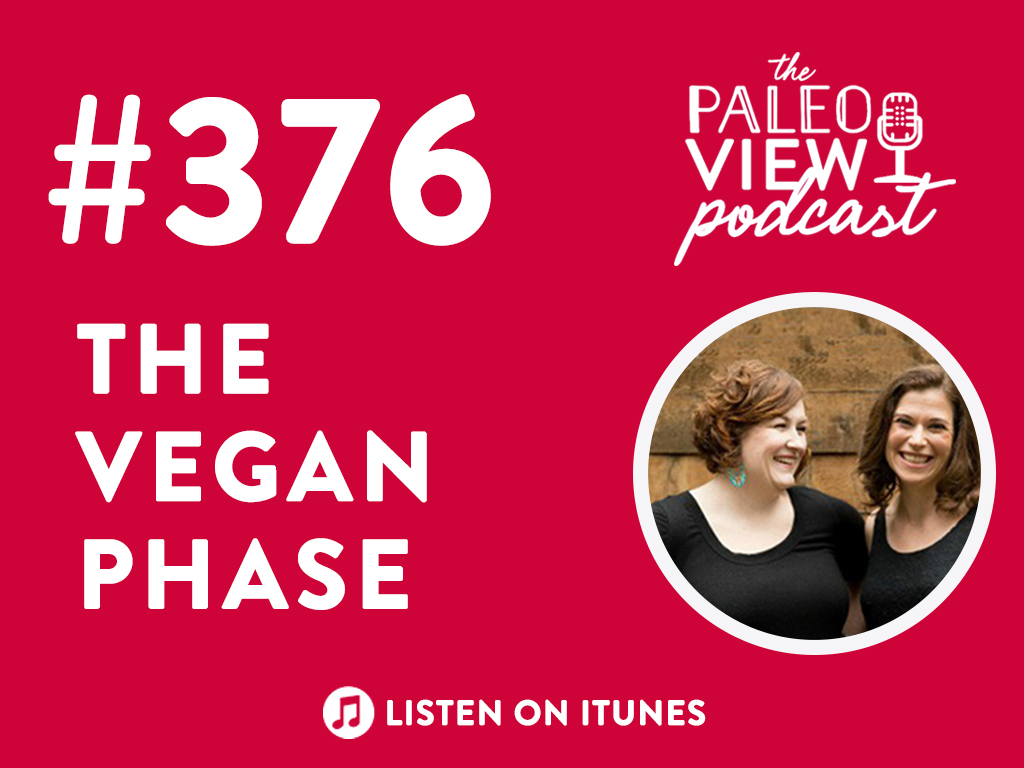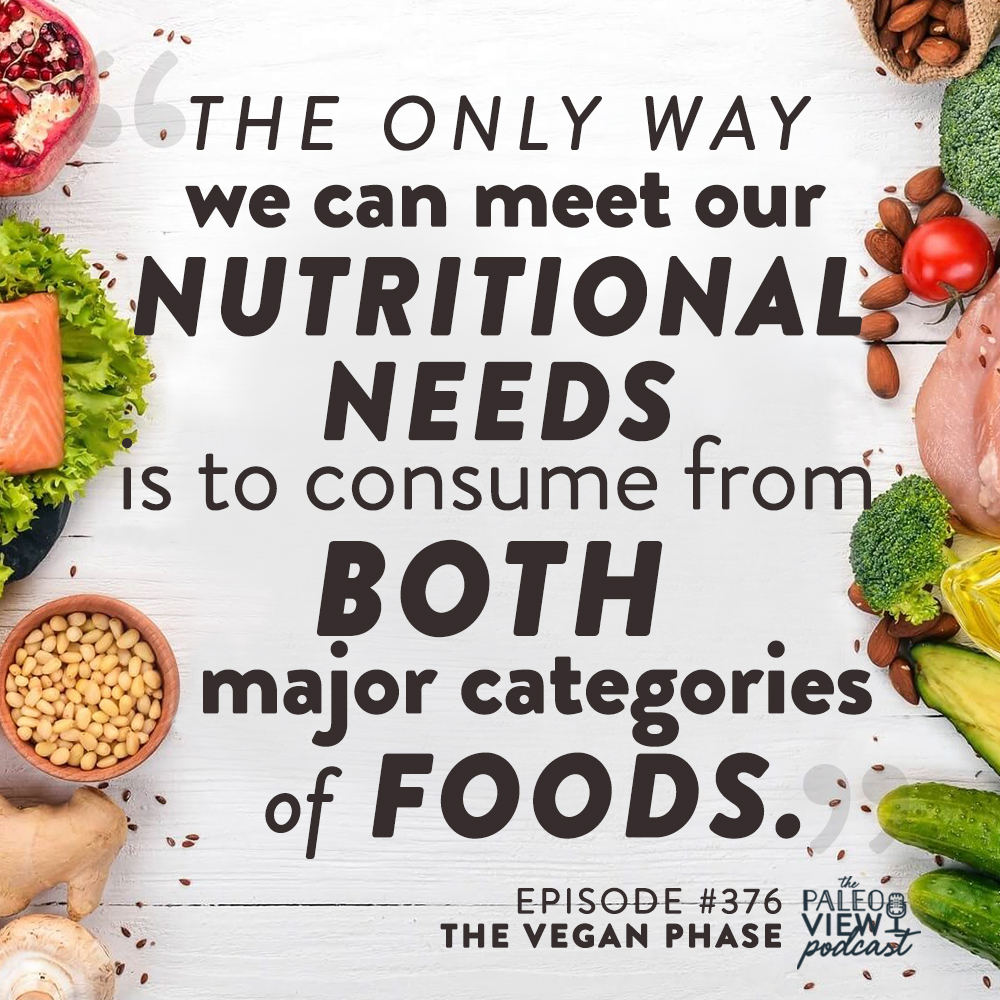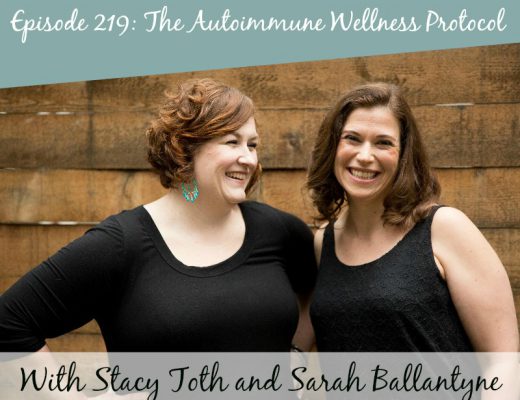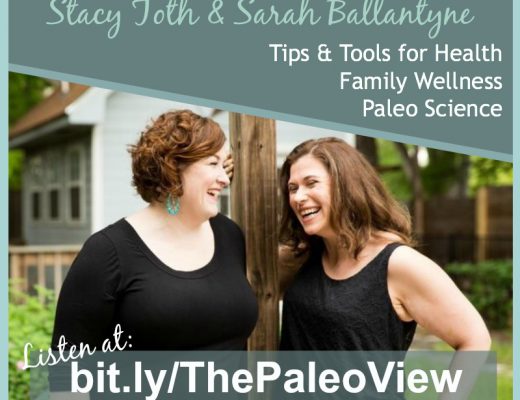
On this week’s episode, Stacy shares an update on her youngest son’s interest to adopt a vegan diet. Stacy shares with listeners how she and Matt are approaching this interest through support and education, and Sarah shares on the nutritional pieces to consider when eliminating animal foods from your diet. Tune in below!
If you enjoy the show, please review it on iTunes!
The Paleo View (TPV), Episode 376: The Vegan Phase
Welcome back to The Paleo View listeners. (0:40)
We have an interesting episode for you this week friends.
Stacy’s nine-year-old is rebelling like a teenager.
Cole is pretty cool as teenagers go. Stacy enjoys his sarcasm and dry humor.
Finnian was recently described by his teacher as gregarious.
Stacy’s baby, Wesley, has a bleeding heart and is very aware of his impact on his community and the world.
He has been passionate for years about consuming meat, which is an interesting topic for Stacy.
Stacy was vegetarian for seven years before she went to college, but she has changed her tune on that.
She now does a lot of educating and sharing about humanely and sustainably raised animals and how important this is to their family.
Wesley has talked about going vegetarian a couple of times but has decided against it until recently.
Recently Wesley saw something on YouTube that inspired him to make the move and go vegan for at least seven days.
Pescatarian is always the route that Stacy has suggested. However, Wesley wanted to go full-on vegan.
From sharing about this challenge on social media, Stacy has heard from so many people that their children also experiment with this.
It has always been Stacy’s approach that children are their own people and they make their own decisions.
As much as this feels like a complete rebellion against everything Matt and Stacy believe, they do want to support that this is something he has thought about for a long time.
Matt and Stacy decided to support him in this challenge, but they also saw it as an educational opportunity.
Sarah commented on how Matt and Stacy empower their children with their choices.
Educational Opportunity
The first thing they educated Wes on was protein, using a graphic from Robb Wolf’s Instagram. (7:44)
They are also discussing micronutrients and what he is missing in a vegan diet.
Wesley is their Paleo baby. He has never had standard American foods, outside of gluten-free treats.
He is following both a gluten-free and vegan food plan right now. Stacy is also avoiding soy and filler junk foods.
They did find a lentil-based burger for Wes, but it was very hard to avoid canola oil in products.
Sarah shared on Canola oil and the history of this product on the food market.
Stacy shared a bit more on the foods they have found for Wes and what he has liked.
What Sarah wants to add to this conversation is about the fat options available to you in a vegan diet. (14:32)
The vegan community has done messaging very well, in terms of how they have distributed their arguments for their choices.
Sarah does agree with the information shared on how negatively impactful the meat, dairy, and processed carbohydrate-heavy the average American diet is.
A big part of the conversation needs to be on how important vegetables are, and how important it is to modify protein intake.
There are nutrients that we get from animal foods that we cannot get from plant foods, and vice versa.
Sarah thinks of Paleo as a plant-based diet.
The only way to meet our nutrient needs is to consume from both categories of food.
Sarah referred to these resources for omnivore education.
We need nutrients from both plants and from animals.
There are plenty of nutrients that you can get sufficiently by either going vegan or carnivore. However, in either extreme, there is a group of nutrients you are missing out on.
Sarah’s views this as an opportunity to talk to the flip side of the coin.
The Nutritional Gap
There are nutrients that we get from animal foods that we either cannot get from plant foods, or we can only get from a very limited list of unusual plant foods. (18:01)
In these cases, it is hard to get sufficient quantities of these nutrients.
The nutrients that we could be missing out on including heme iron, the animal form of vitamin A, zinc, vitamin B12, vitamin K2, vitamin D3, CLA, DHA, EPA, creatine, taurine, carnitine, and selenium.
Sarah shared a bit about the various ways you can supplement your vegan diet to fill some of these nutrient misses.
Protein requirements are an additional challenge on a Vegan diet because plants are not a source of complete protein.
Complete protein refers to a food that contains all nine essential amino acids.
One of the things that is a trick is looking at combining foods in order to get all of those essential amino acids.
The classic mixing is to mix a grain and a legume to get all nine essential amino acids.
It is really hard from plant-based sources to get enough leucine.
Thre is a careful selection of food that can help round out the amino acid intake, but the other typical recommendation is that vegans need to consume more plant proteins to simply get enough protein.
Protein Absorption
There is this whole other side of the protein challenge for vegans and vegetarians, which is the digestible indispensable amino acid score.
Our digestive enzymes are not very great at breaking down plant proteins.
There is a score that looks at how much of the protein is wasted through the digestive tract.
The scores range from 0, which is completely non-digestible, to 1, which is considered fully digestible.
There are some animal foods that score higher than 1 though.
For example, beef is 1.1, chicken is 1.08, fish is 1.
This means that in an average human digestive tract, the protein is 100% digested.
Tofu has a score of 0.52, kidney beans have a score of 0.51, peanuts have a score of 0.43.
Plant-based proteins, at best, half of the protein is fully digested in the digestive tract.
If you are active, trying to build muscle or trying to lose weight, all of these things increase your protein requirements.
Your health goals are more easy to achieve with higher protein intake.
Sarah personally aims for about 2 grams of protein per kilogram of body weight, per day, spread out amongst three meals. (32:49)
Getting this amount of protein is fairly straightforward, using dense protein sources.
However, in the context of plant-based proteins, you have to consume a lot of food to fulfill your protein requirements.
On top of that, you still have to supplement to hit your micronutrient needs.
The main takeaway is that humans are omnivores and there are nutrients that we get from animal foods, that we can’t get from plant foods.
That doesn’t mean that we need to eat a ton of animal foods to meet our nutritional needs.
Like Stacy was saying at the start of the show, you can get these nutrients from a pescatarian diet.
Sarah sees pescatarian as a really good compromise.
You would need to eat shellfish.
Long-Term Effects & Impacts
In the absence of animal food, it is basically impossible to achieve nutrient sufficiency, even with supplements.
There is not a good idea of what happens when you don’t get enough creatine over the course of your life.
We understand the consequences of many micronutrient deficiencies, but we don’t fully know the longterm impacts of amino acid deficiencies.
The term non-essential is very misleading.
Sarah tries to respectfully explain the need for nutrients in the context of a modest serving of an animal food, and lots and lots of vegetables, fruits, nuts, and seeds.
We can incorporate that with a focus on humanely raised meats.
Returning to a decentralized food manufacturer system is a great way to balance the global environmental impact of raising meat, by recognizing the human nutritional needs to animal foods.
Stacy shared more on why this point is so important to her, and ultimately inspired Matt and Stacy to write Beyond Bacon.
The importance of respecting an animal’s life and the kingdom of life is a very important piece of this dietary puzzle.
The importance of the work that Diana Rodgers is doing.
Sarah shared information on salmon migration and hatchery programs.
This is just one great example of how measures are being taken to both cares for the environment and the animal kingdom.
Thinking of an animal at the end of its life cycle, which is the ideal time to harvest it.
Supporting Others Choices
The important part for Stacy is that all of these topics hit on the points of discussion she is having with Wesley.
No matter what age a child is, Stacy thinks that the idea and the popularity of vegan/vegetarianism, is not just something that is cool, but also because there is compassion.
If this is how someone feels, there are other things that we can think about to bridge the gap between how someone feels and respecting our own health.
Stacy is empowering and supporting Wes and shared on why she feels it is important to encourage this experimentation while he is under her roof.
While Stacy started as a vegan when Matt and Stacy first started dating, they both educated each other and met in the middle.
Stacy’s brother grew up a vegetarian but became a vegan when he went away to college.
Stacy also shared on the work that her brother is doing to reduce food waste.
Adding in Probiotics
One of the things Stacy has been focusing on with Wesley is adding in probiotics. (57:02)
Stacy shared the gluten-free and vegan supplements that Wesley is taking during his 7-day challenge.
Wesley’s gut health is strong and is able to take on this dietary modification.
Stacy shared an update on the first three days of Wes’s challenge.
She thinks that he isn’t experiencing as much digestive distress as expected because of the probiotics he is taking
Wesley is taking his Thrive probiotics in the morning, and also having a Forager smoothie.
Matt and Stacy have never been diligent about the kids taking probiotics, but for Wes this has changed.
Sarah shared science on the role of animal products on the gut microbiome.
While writing her new book, Sarah was most interested in writing about what is good for the gut microbiome. It is not a Paleo book.
It has been fascinating to Sarah to dig into this research beyond bacterial strains.
She has found another argument for omnivorism through her research.
There is this additional effect of dietary changes on the gut microbiome that depending on what the diet is, might be beneficial or might not be.
In the context of a diet that is missing something important for the gut microbiome, like veganism, supplementing with probiotics makes a whole lot of sense.
Stacy shared why Thrive probiotics, in particular, is her brand of choice.
Closing Thoughts
Stacy shared her latest happy moment in her food preparation for Wes’s vegan meals. (1:08:40)
Gluten-free vegan is a really hard diet to follow, as options are really limited.
Just because Wes wants to experiment with a vegan diet, there are certain household rules that Matt and Stacy are not flexing for him.
Stacy shared some additional food ideas that she has come across in prep for Wes’s 7-day challenge.
There is a highlight bubble on Stacy’s Instagram account with these ideas listed if you are interested.
Sarah hopes that this conversation helped other parents who are in similar situations.
Listeners can save 15% on Thrive probiotics by using the code ‘PaleoView15’ by visiting this link.
Sarah is looking forward to an update on the Wes-vegan phase next week.
Thank you so much listeners! Please don’t forget to share this with your community and to leave a review!
Stacy and Sarah love it when you engage with them on social media.
Your hosts will be back again next week! (1:16:08)





